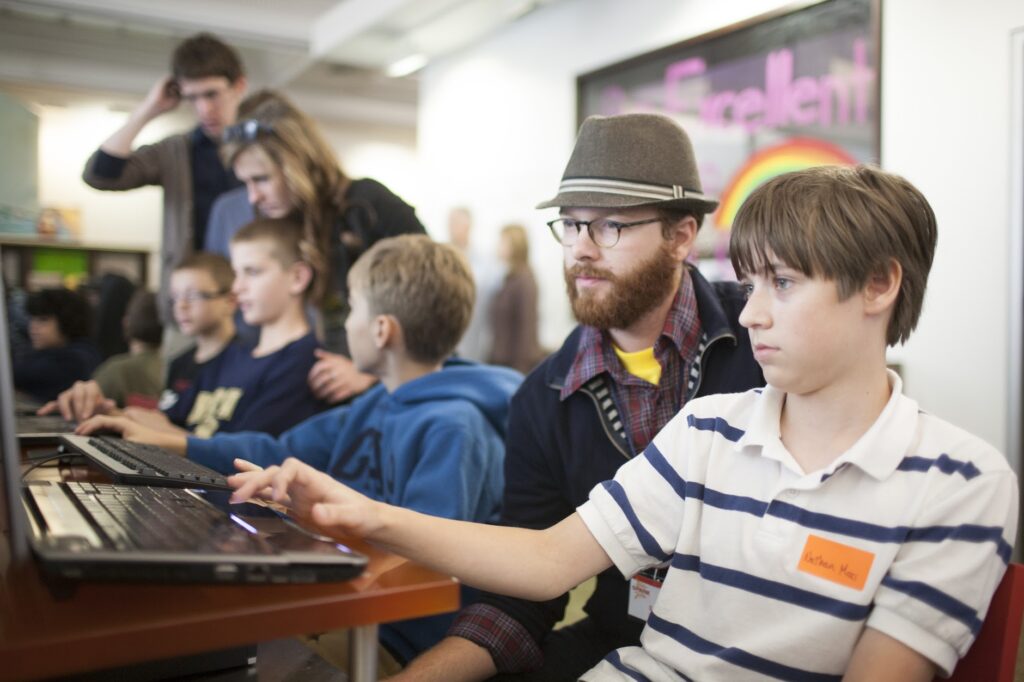My idea of a great afterschool program would be a place where anyone could come and do whatever activity they want. I hear some of the staff talking about ‘Youth Voice.’ I think youth voice is great but youth voice combined with youth choice is the best model. – Dakari T.
Back in 2014 I was introduced to the Heinz Endowments: Summer Youth Philanthropy Internship Program. It provided Pittsburgh teens the opportunity to work in teams to research and select a concern related to them and their communities, create a Request for Proposals, and award grants to local nonprofits that strived to address that concern. I had never heard of teens being involved in the grantmaking process. I thought it was unique and needed.
Fast forward to 2020 in Southeast Michigan and Western New York, Generator Z, a grantmaking initiative and ideas lab created by the Ralph C. Wilson Foundation, expanded the idea of youth philanthropy. They selected over 1,000 teens as generators to publicly share their personal stories and afterschool ideas. Generators were paid for their participation and almost 100 afterschool providers received funding to implement projects inspired by generators. Teens were involved in setting the tone for Generator Z and selecting grantees.
In both these examples it seems like youth philanthropy is more than simply funding organizations. It’s about co-creating platforms for teens to share with adults what’s important to them – their concerns and how these concerns can be addressed.
So, what did teens say in 2020, in the middle of a pandemic, was important to them in afterschool programs? I turned towards the Generator Z website to find some answers. Mental, Social, & Emotional Health, Creative Arts & Culture, and Play & Sports were three themes selected by generators.
Mental, Social, & Emotional Health
Teens wrote they want counselors and therapists available afterschool to support their mental health needs. Sam’s idea was a hang out spot with snacks and video games but wanted the program to focus on mental health.
There would also be a therapist on-site so students could get free therapy. Many are unable to afford help or are refused to get it from their parents, so a free, unbiased mental health resource is huge for teenagers. – Sam
There were teens that based their afterschool idea on their life experiences. Delanie D.’s story and idea showcased this. Delanie shared she was sexually assaulted and wanted help healing from this trauma. Her afterschool idea included aspects of teaching about consent and the effects of sexual assault on mental health.
Creative Arts & Culture
Some teens described programs that combine art with other ideas such as environmental awareness (PopArt), self-exploration (Ife M.), collaboration (Nick C.), and self-expression (Tia V.). Teens also wanted to learn more about both their own culture and other cultures (Noor N., Amma, and Aidan B.).
Play & Sports
While playing sports during their afterschool time was important to many teens, some mentioned wanting to be sure everyone was included in the sports. For example, Allyson K. said, “I want everyone to feel welcome and invited here and not have to worry about the feeling of being left out or all by themselves.”
I am thankful to the generators for their vulnerability. From their stories, I learned that having fun is important to teens, but it’s not all they are looking for. They want spaces that are safe and inclusive, people that are accepting and caring, places that provide resources and services, and opportunities for them to learn and grow.
Dakari T. sums up youth philanthropy nicely, “…youth voice is great but youth voice combined with youth choice is the best model.” Based on these examples it’s listening to what teens value and involving them in the entire grantmaking process from conception to evaluation.
For more information on the Generator Z grantmaking initiative, visit their website. It hosts generators’ stories and afterschool dreams, along with aspects of the afterschool providers’ proposals, including how generators inspired their idea. Follow @generatorzfuture on Facebook and Instagram for more highlights of generators and grantees.
While this post is based on my personal experiences, I am a part of the evaluation team for Generator Z. I’d like to recognize the rest of the evaluation team (Drs. Tom Akiva, Josi Bañales, and Sharon Colvin, Tracy Medrano, Alfred Rodriguez, Selam Mekbeb-Gillett, and Sofina Shekhar) and the Generator Z team (Abir Ali and Contributors) for all their hard work with this project.
